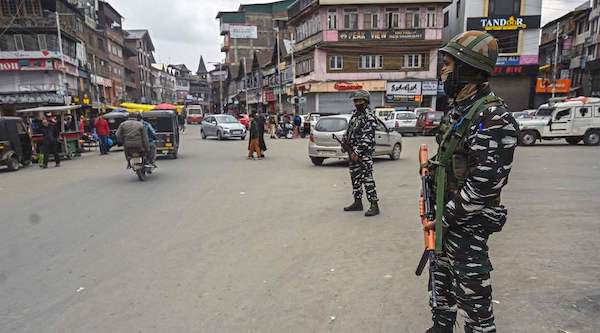
Indian paramilitary troopers stand guard at a market in Srinagar on October 24, 2021. (Photo by AFP)
At least six suspected militants and an Indian soldier have been killed in separate clashes in Indian-controlled Kashmir, as tensions and fatalities rise in the disputed Himalayan region.
"Six militants, including two Pakistan nationals, have been killed in two separate encounters with the security forces in Anantnag and Kulgam districts of Kashmir," the Kashmir valleyís police chief Vijay Kumar said on Thursday.
A police statement issued later in the day said one of the four government forces personnel wounded in the clashes had died of bullet injuries in a hospital.
Indian authorities say at least 380 suspected militants, nearly 100 civilians, and over 80 security forces personnel have been killed in the Muslim-majority region since August 2019.
At least 2,300 people have also been arrested under the vaguely worded anti-terror legislation called the Unlawful Activities Prevention Act (UAPA), which effectively allows people to be held without trial indefinitely.
The practice has been extensively used in the Indian-controlled territory since the special status of Kashmir was revoked more than two years ago.
The UN Human Rights Office (OHCHR) earlier this month said that the UAPA "raises serious concerns relating to the right of presumption of innocence along with other due process and fair trial rights."
The government of Indian Prime Minister Narendra Modi revoked the self-autonomy of Kashmir in 2019, in a move described by neighboring Pakistan as illegal. Since then, India has imposed more internet shutdowns and other restrictions in the disputed Muslim-majority region.
Kashmir has been split between India and Pakistan since their partition in 1947. Both countries claim all of Kashmir and have fought at least three wars over the territory.
New Delhi accuses Islamabad of supporting pro-independence fighters, an allegation rejected by the Pakistani government. Islamabad, in turn, is critical of Indiaís heavy military deployment to Kashmir and its crackdown against the regionís Muslim population.
India extends security law in Nagaland
Separately, the Indian government extended a special law giving armed forces sweeping powers in the northeastern state of Nagaland.
The six-month extension issued by Indiaís ministry of home affairs said the government believed the state was "in a disturbed and dangerous condition."
"The use of armed forces in aid of the civil power is necessary," the government said, justifying the extension of the Armed Forces Special Powers Act (AFSPA).
The extension comes days after a botched army ambush killed 14 civilians in the stateís remote Mon district, near the Myanmar border.
Another eight people were killed by troops when they were confronted by an angry crowd. A soldier was killed and a military vehicle was set alight.
The killings triggered protests against the law which gives the armed forces sweeping powers to conduct raids, warrantless searches and open fire, with broad protection from prosecution.
Nagaland and other states in northeast India have seen decades of unrest among ethnic and separatist groups.
Left-wing Maoist insurgents launched a peasant uprising across India in the early 60s.
The Maoist guerrillas, who say they are fighting for the rights of tribal people and landless farmers, are referred to as Naxals. The name is derived from a Maoist rebellion originating in the Naxalbari village of the eastern West Bengal state in 1967.
The Maoists are believed to be present in at least 20 of Indiaís 36 states and union territories.
The decades-long insurgency has cost thousands of lives in the guerrilla-dominated "Red Corridor" stretching through central and eastern India.
LINK: https://www.ansarpress.com/english/25445
TAGS:






























 online news tv
online news tv




